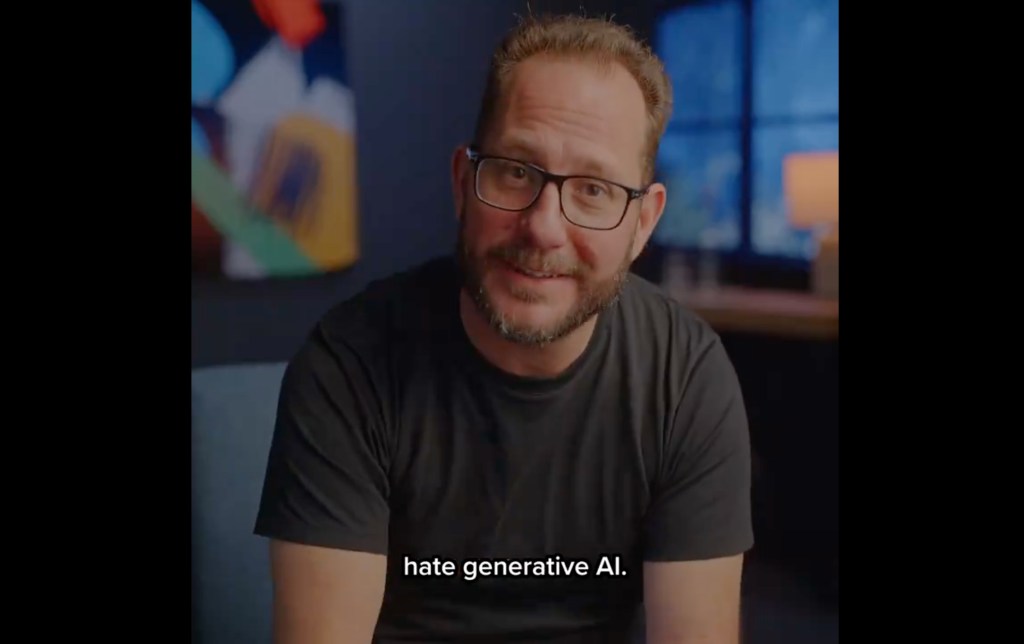‘I really f**king hate generative AI’ – Procreate CEO comes out swinging against new tech
A calculated and savvy marketing move on Procreate’s part to seize the space left behind by Canva and Adobe Creative Cloud. …


Join our daily and weekly newsletters for the latest updates and exclusive content on industry-leading AI coverage. Learn More
Disclaimer: VentureBeat uses generative AI to create selected article imagery and other assets.
Designed by Australian firm Savage Interactive, the digital illustration app Procreate was launched in 2011 to embrace one new wave of tech change: tablet computing, specifically, the Apple iPad. But now its CEO James Cuda is vehemently rejecting another big technological shift: generative AI.
“I really fucking hate generative AI,” Cuda said in a video released on the official Procreate account on the social network X last night. “I don’t like what’s happening in the industry and I don’t like what it’s doing to artists. We’re not going to be introducing any generative AI into our products.”
Cuda followed up this strong stance by further explaining his stance: “Our products are always designed and developed with the idea that a human will be creating something…we believe we’re on the right path supporting human creativity.”
In addition, Procreate posted a new webpage at Procreate.com/ai that further outlines its commitments to not using gen AI for its products and states:
“Generative AI is ripping the humanity out of things. Built on a foundation of theft, the technology is steering us toward a barren future. We think machine learning is a compelling technology with a lot of merit, but the path generative AI is on is wrong for us.
We’re here for the humans. We’re not chasing a technology that is a moral threat to our greatest jewel: human creativity. In this technological rush, this might make us an exception or seem at risk of being left behind. But we see this road less travelled as the more exciting and fruitful one for our community.“
The latest salvo in escalating war of words between gen AI proponents and detractors
The anti-gen AI position has already been applauded by some artists on X and other social platforms, who, like Cuda, view the tech or many of the leading software applications that leverage it — such as online image generation services from the likes of Midjourney, OpenAI, Magnific, Stability AI, even X itself via Grok 2 — as having exploited or stolen from artists by scraping their works to train models on them without permission, compensation, or consent.
Procreate’s statements may align it with some gen-AI critical artists, but it is in my view, a little odd and inconsistent of a stand to take for a brand that readily embraced other disruptive tech — such as touchscreens and styluses and pixels — that also competes with more traditional art techniques (e.g. painting or drawing on paper).
In addition, the idea that by rejecting gen AI, Procreate is supporting “human creativity” is a little bit of a straw man argument to me, since humans also still need to enter the prompts and adjust them — sometimes many times — to create images with gen AI applications as well. Even in the case of gen AI software, humans are still driving it.
It certainly appears to be a calculated and savvy marketing move on Procreate’s part to seize the space left behind by other rival illustration and creation software such as Canva and Adobe Creative Cloud, both of which have rushed to introduce a flurry of gen AI features to the criticism of some users.
Procreate’s statements mark the latest and starkest example of how the rhetorical battle lines are being drawn around gen AI — with some defending and embracing the tech while others accuse it of being ethically, morally, or even legally unsound due to the sources and processes used to obtain its training data.
Awaiting legal rulings to clarify legality of data scraping and training
Just a week ago, some artists were celebrating as a class-action copyright infringement lawsuit against Midjourney, Runway, and Stability AI was allowed to move forward toward discovery.
The judge has yet to rule decisively in the case whether gen AI companies’ mass scraping and use of artworks online — including, likely many copyrighted artworks — constitutes infringement. This despite the fact that Google and other companies previously scraped the web en masse for search indices and databases used for commercial products, without much pushback from the same group of artists and creators.
Ultimately, it’s clear that even as the gen AI age wares on, there are many hold outs and those resistant to embracing what they view as exploitative and morally compromised new tech — and they’re not afraid of calling it out as such.